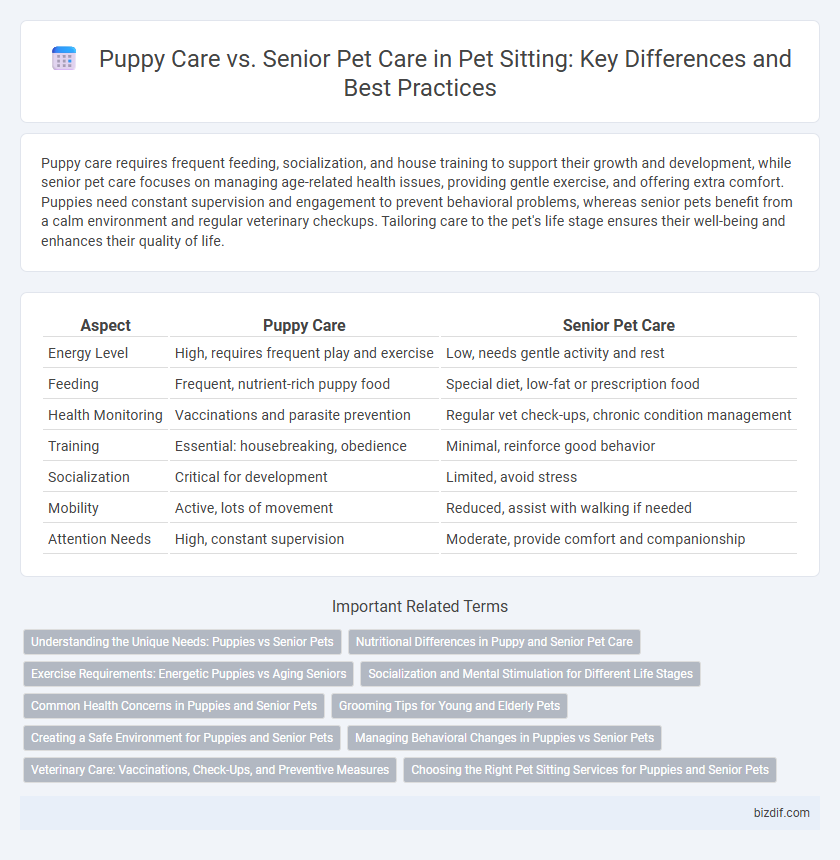Puppy care requires frequent feeding, socialization, and house training to support their growth and development, while senior pet care focuses on managing age-related health issues, providing gentle exercise, and offering extra comfort. Puppies need constant supervision and engagement to prevent behavioral problems, whereas senior pets benefit from a calm environment and regular veterinary checkups. Tailoring care to the pet's life stage ensures their well-being and enhances their quality of life.
Table of Comparison
| Aspect | Puppy Care | Senior Pet Care |
|---|---|---|
| Energy Level | High, requires frequent play and exercise | Low, needs gentle activity and rest |
| Feeding | Frequent, nutrient-rich puppy food | Special diet, low-fat or prescription food |
| Health Monitoring | Vaccinations and parasite prevention | Regular vet check-ups, chronic condition management |
| Training | Essential: housebreaking, obedience | Minimal, reinforce good behavior |
| Socialization | Critical for development | Limited, avoid stress |
| Mobility | Active, lots of movement | Reduced, assist with walking if needed |
| Attention Needs | High, constant supervision | Moderate, provide comfort and companionship |
Understanding the Unique Needs: Puppies vs Senior Pets
Puppy care requires attention to house training, socialization, and frequent feeding schedules to support rapid growth and development. Senior pet care focuses on managing age-related health issues, gentle exercise, and specialized diets tailored to conditions like arthritis or kidney disease. Understanding these distinct needs ensures proper comfort, nutrition, and overall well-being for pets at different life stages.
Nutritional Differences in Puppy and Senior Pet Care
Puppies require a nutrient-rich diet high in protein, fats, and essential vitamins to support rapid growth, development, and energy needs. Senior pets benefit from diets lower in calories and fat but higher in fiber and antioxidants to maintain healthy weight and support joint, kidney, and immune function. Tailoring meals to these nutritional differences ensures optimal health and longevity at each life stage.
Exercise Requirements: Energetic Puppies vs Aging Seniors
Puppies require frequent, moderate exercise to support their rapid growth and high energy levels, promoting healthy development and socialization. In contrast, senior pets need gentle, low-impact activities tailored to their reduced stamina and potential joint issues, helping maintain mobility without causing stress. Balancing exercise intensity with age-specific needs is critical for optimal pet health and well-being throughout their lifespan.
Socialization and Mental Stimulation for Different Life Stages
Puppy care emphasizes socialization through frequent exposure to new environments, people, and other animals to develop healthy behavioral patterns and prevent future anxiety. Senior pet care focuses on tailored mental stimulation activities such as gentle play, scent games, and puzzle feeders to maintain cognitive function and reduce signs of aging-related cognitive decline. Both stages require age-appropriate social interaction to support emotional well-being and overall health.
Common Health Concerns in Puppies and Senior Pets
Puppy care requires vigilance for common health concerns such as parvovirus, worms, and proper vaccination schedules to ensure strong immune development. Senior pet care often focuses on managing chronic conditions like arthritis, dental disease, and kidney or heart problems, necessitating regular veterinary check-ups and tailored medication plans. Both life stages benefit from targeted nutritional support and monitoring to address their unique health challenges effectively.
Grooming Tips for Young and Elderly Pets
Puppy care grooming emphasizes gentle brushing to prevent tangles, regular nail trimming, and frequent ear cleaning to avoid infections as their skin and coat are delicate. Senior pet grooming requires extra attention to sensitive skin, using hypoallergenic shampoos, careful brushing to manage thinning fur, and monitoring for lumps or skin changes. Both young and elderly pets benefit from routine dental care and hydration to maintain overall health and comfort.
Creating a Safe Environment for Puppies and Senior Pets
Creating a safe environment for puppies involves securing small, chew-proof toys and blocking off hazardous areas to prevent accidental ingestion or injury. Senior pets require comfortable, accessible spaces with non-slip surfaces and reduced obstacles to support mobility and minimize fall risks. Tailoring the environment to each pet's developmental stage enhances overall safety and well-being during pet sitting.
Managing Behavioral Changes in Puppies vs Senior Pets
Managing behavioral changes in puppies involves consistent training, socialization, and positive reinforcement to address energy, teething, and curiosity-driven behaviors. In senior pets, caregiving focuses on accommodating slower mobility, sensory decline, and potential cognitive dysfunction, requiring patience and gentle routines. Tailoring care strategies to developmental stages ensures effective management of behavioral shifts in both puppies and older pets.
Veterinary Care: Vaccinations, Check-Ups, and Preventive Measures
Puppy care requires a strict vaccination schedule, including distemper, parvovirus, and rabies vaccines, with frequent veterinary check-ups to monitor growth and development. Senior pet care emphasizes regular veterinary visits to manage chronic conditions, with tailored vaccinations such as annual boosters and preventive measures against arthritis and age-related diseases. Preventive care for both age groups involves parasite control, dental health maintenance, and nutritional assessments to ensure overall well-being.
Choosing the Right Pet Sitting Services for Puppies and Senior Pets
Selecting the right pet sitting services requires understanding the distinct needs of puppies and senior pets, as puppies need frequent monitoring, vaccination support, and socialization, while senior pets often require specialized medical attention and gentle handling. Professional pet sitters with experience in puppy care ensure proper training and stimulating activities, whereas those skilled in senior pet care provide comfort, medication management, and mobility assistance. Tailoring pet sitting services to these specific life stages enhances the health, happiness, and well-being of both puppies and senior pets.
Puppy care vs Senior pet care Infographic

 bizdif.com
bizdif.com